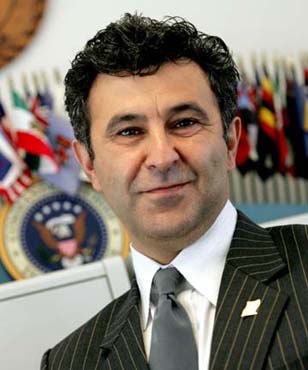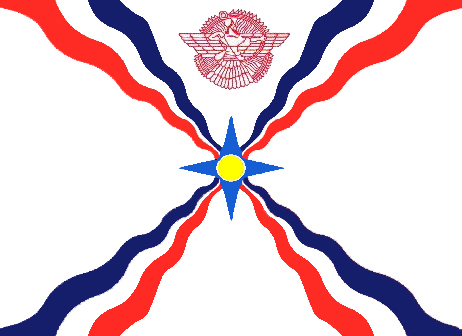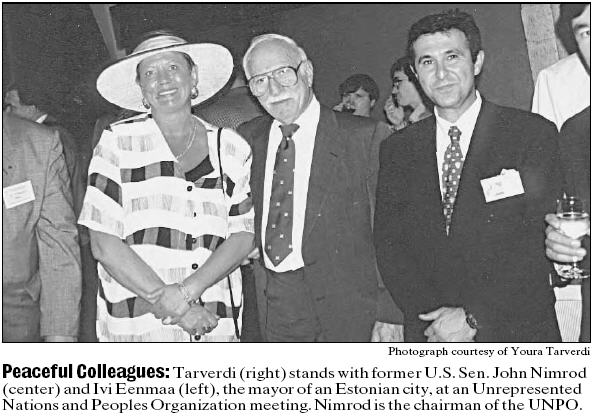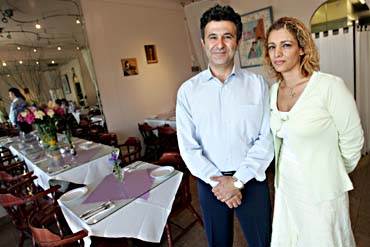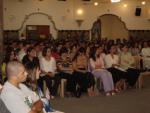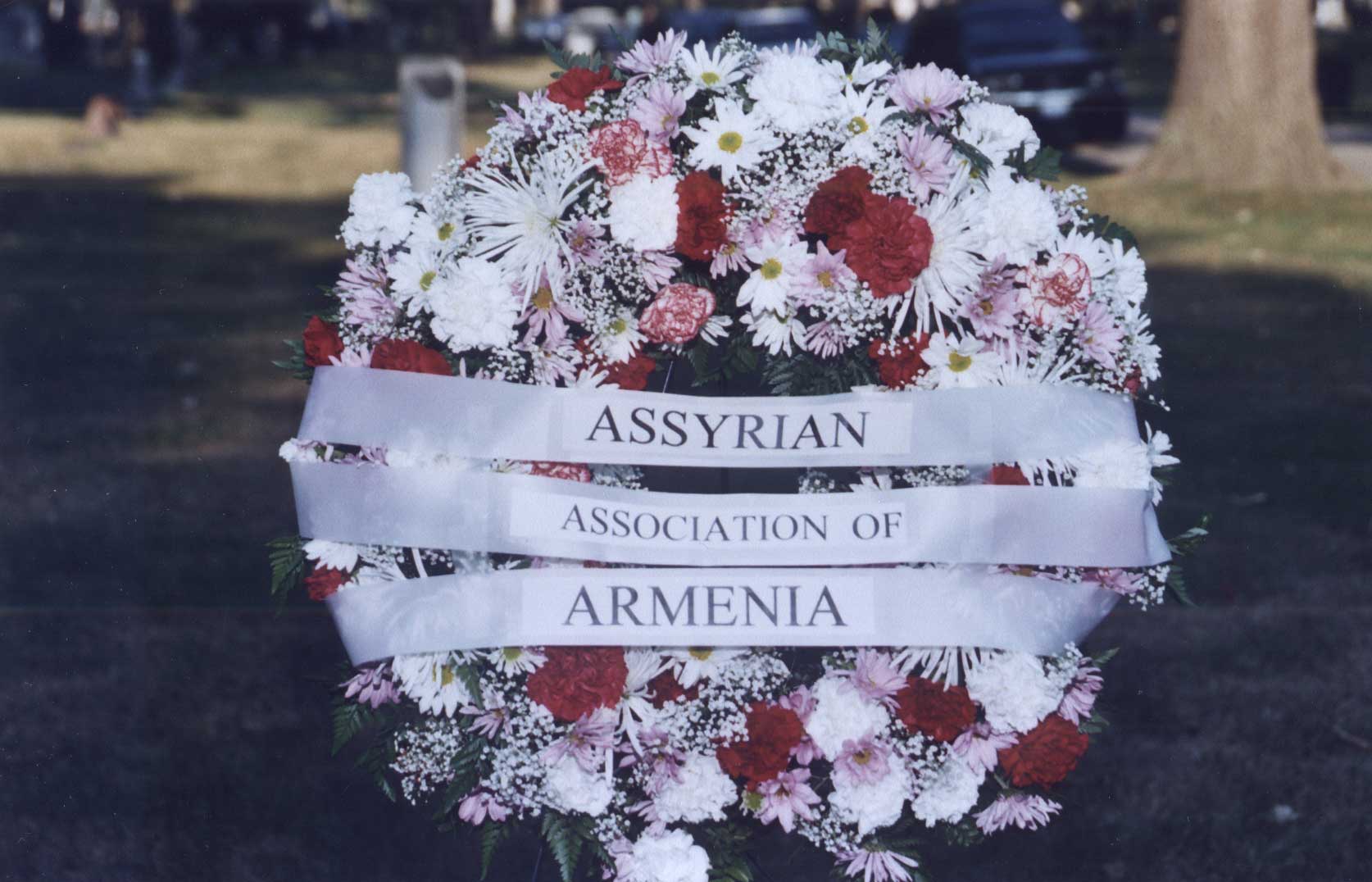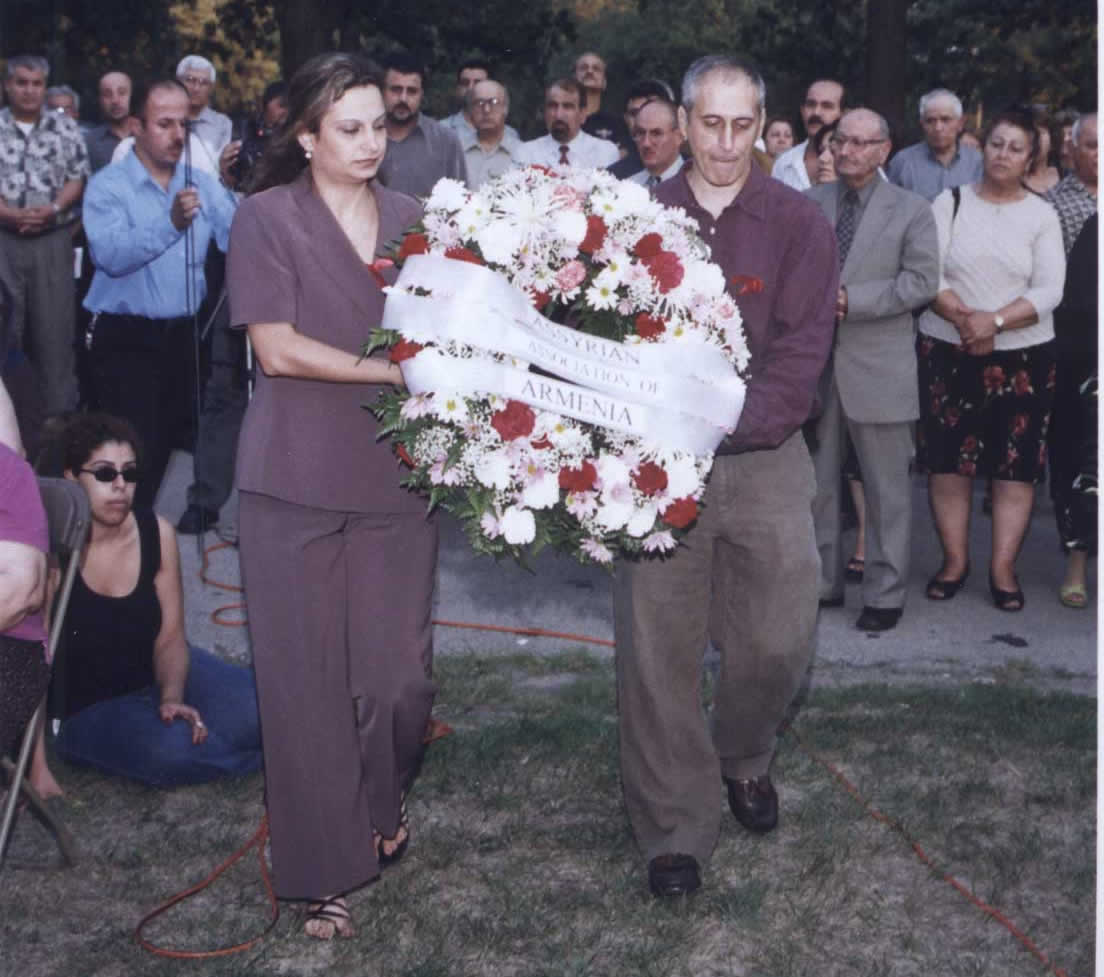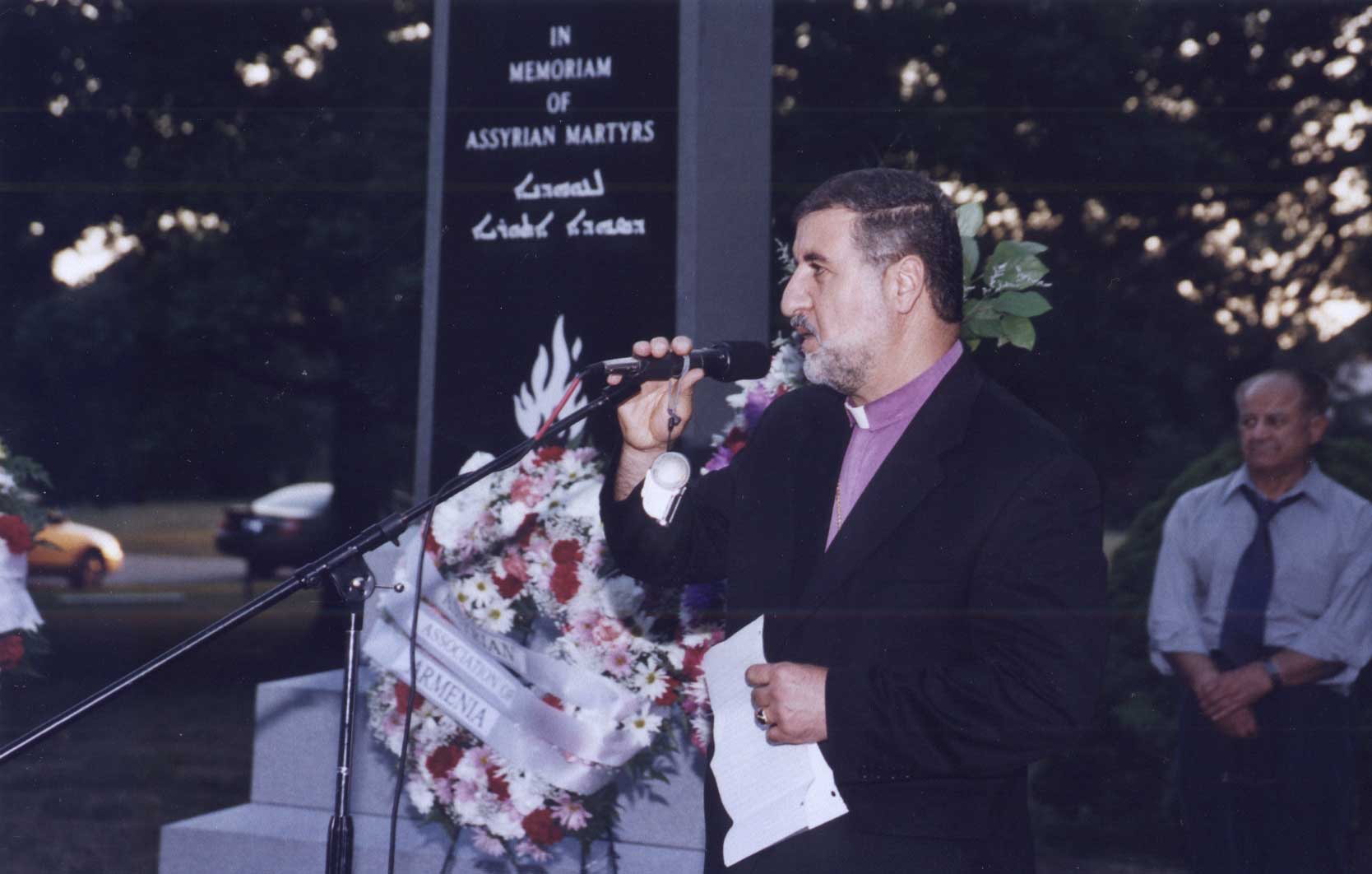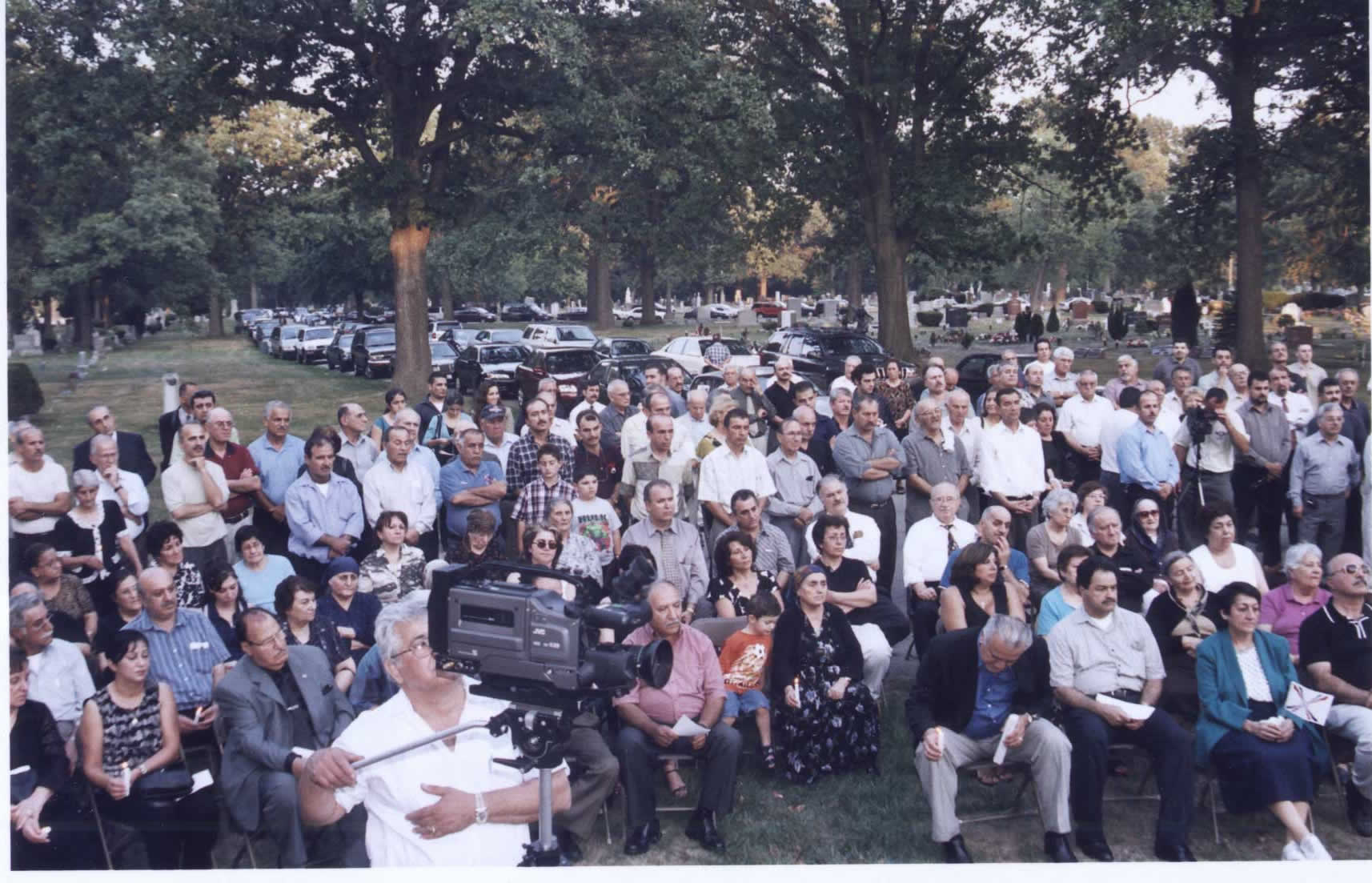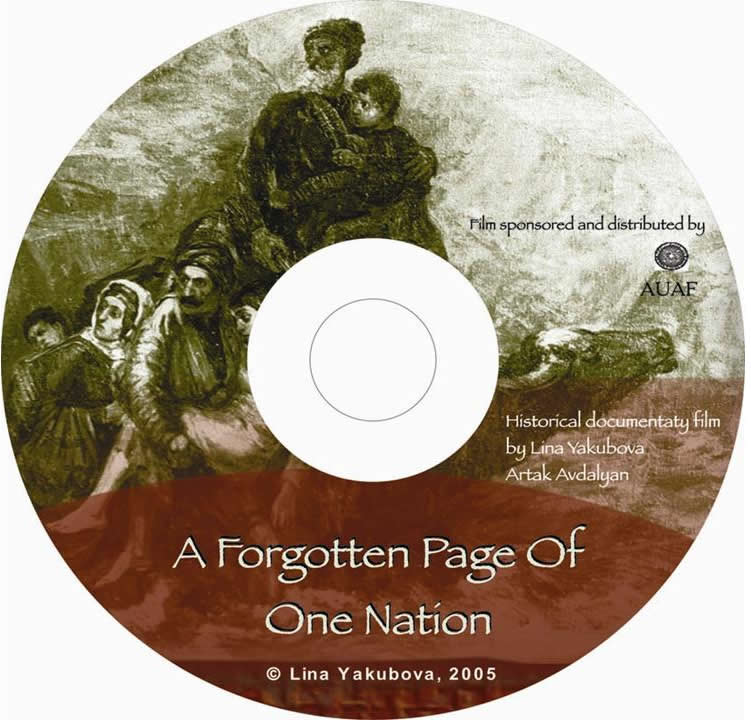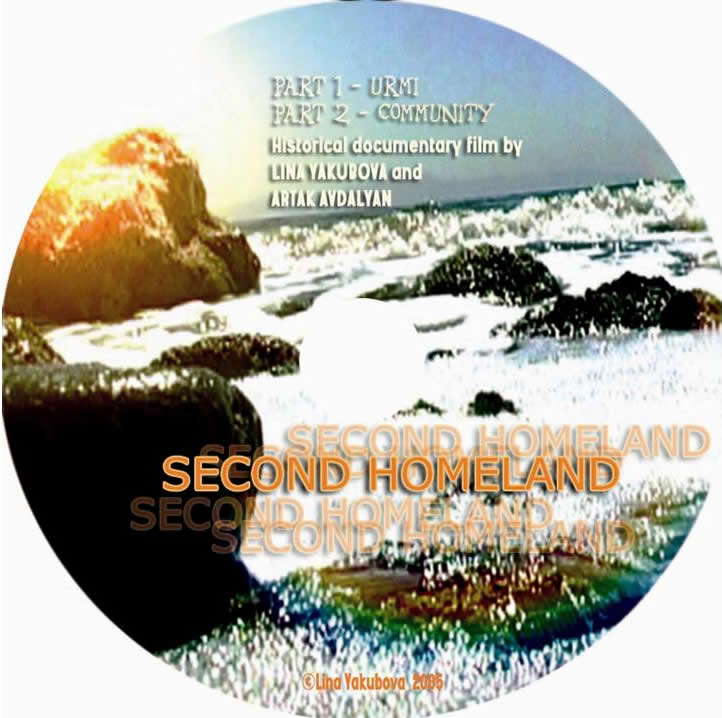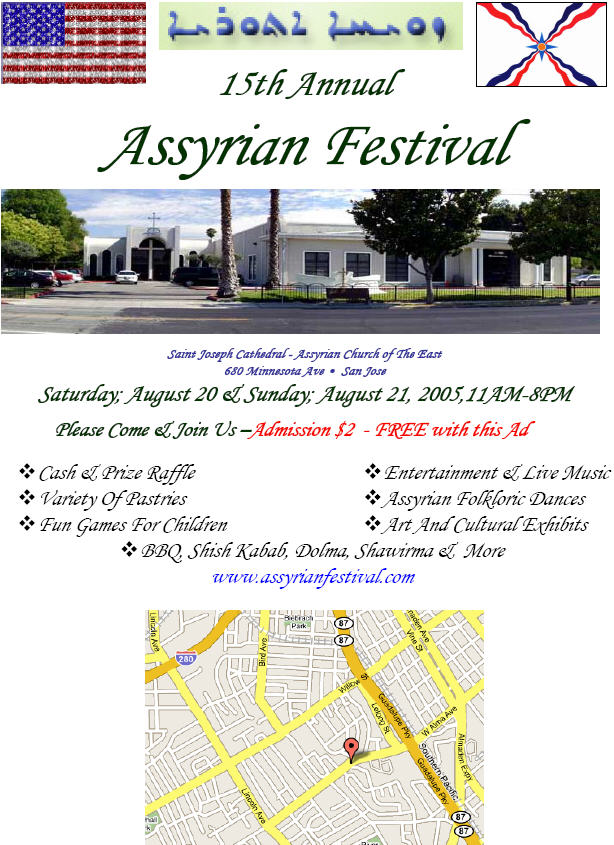Who Lost Iraq?
Rev. Ken Joseph Jr.
Japan
As the dust begins to settle around the dream that was Iraq, the finger pointing is beginning.
`Who lost Iraq?` is the simple, but profound question that many are beginning to ask.
As one who was in Iraq during the time of Saddam and has been their since as an Assyrian Christian, the indigenous people of Iraq the answer to that question is not just academic - it directly relates to the future of our people, the Assyrian Christians who are the original people of Iraq long before the Arabs came.
We are the people of `Nineveh` to whom Jonah came and comprise one of the last remaining major Christian communities in the Middle East.
First, is the question of Saddam. I was there. In an upcoming book entitled `I Was Wrong` I describe what life was under Saddam. I was originally against the war, but when I saw the terror that was Saddam and the pain my family lived under I was quickly brought back to reality.
Rev. Joseph holding the Assyrian flag standing
in
an area outside of Baghdad in 2003.
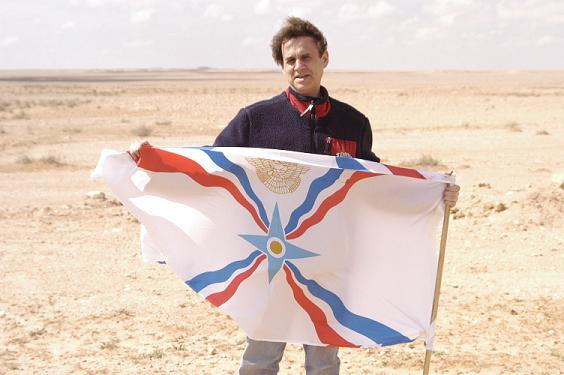 |
It was terrible under Saddam Hussein! The `real` Abu Ghraib prison was a place where my relatives were beaten every day - after Lunch and Dinner. Monday and Saturday were the days people were hanged.
My relatives reaction to the Abu Ghraib `scandal`? They were angry - angry at the fact that the Americans could not do anything to try and get the truth out of those who oppressed them!
Chemical weapons? I was there! The great fear of the residents of Baghdad in the days leading up to the war were not the Americans - they were afraid of Saddam and all the weapons they believed he had and how he would unleash them on them when cornered. Everybody believed he had every possible weapon to obtain and would unleash it all!
Second, the deep appreciation for the Liberation of their country from Saddam. I was there! Imagine for the first time in your life being able to use a cellphone, surf the internet, speak on the telephone without fear, talk to your neighbors without being afraid, watch `normal` TV, wake up in the morning without having to see Saddam everywhere! Happy? They were delirious to have him gone!
Third, though is the real question. Why has Iraq gone so badly? The answer is a bit complicated, but there is an answer and it is still not too late.
Simply put Iraq was `lost` by Americans. Essentially two types of Americans who ruled Iraq in the days and months following the fall of Saddam.
In my upcoming book, `I Was Wrong`, I detail the many experiences we had firsthand.
The first type was what I call the `good guys`! If Americans have one major fault it is that they are so positive and forward looking and `good` that they have a hard time understanding how `evil`, `Evil` really is!
That was the lesson I learned under Saddam. Yes, he was really that evil and yes, in the 21st century there is such evil!
The `good guys`, where the `aw shucks` Americans that came into Iraq and did their best to organize, fix and restore Iraq. They could not imagine that anyone would purposely try to work against what clearly the Iraqis wanted.
I watched them, many times with tears in my eyes as they worked so hard, under such terrible conditions to make things better for Iraq.
`Why are you here?` I would ask over and over. The answer was always the same `I just want the Iraqis to have what we have. Just doing my job!`
How simple, how naive and yet how powerful.
A half century my own parents came to Japan following the end of the war with Japan and are still there. In talking to the men and women risking their lives to see Iraq restored I kept flashing back to my own parents.
A half century after he had first gone to Japan I asked my own father `Why, Dad did you come to Japan`
His answer? `Because Japan needed help!`. DAD! That’s all? You have been here for 50 years now.
No matter how hard I push him that is all the answer I can get. `Because they need help?` How foolish! How naïve! How powerful!
The first group that `lost Iraq` are the `good guys` the men and women who gave of their lives and their time to rebuild Iraq so the Iraqis could be free.
As my father, a half century after he first came they cannot understand or fathom how evil people can be that they would work against progress, blow up children, rape women and destroy oil fields.
They just don’t understand!
The second group? `The opportunists`. These were many of the people working in the CPA - Coalition Provisional Authority who were there not to see Iraq restored, but simply to get a good line on their resumes and to get a job in the new administration.
A year ago those who were hoping for a job in a Kerry Administration had every incentive to see Iraq fail. While it is very difficult to point to specific instances, put yourself in the position of a staffer desperate for a job in a Kerry administration in January.
The best way to insure it? For Iraq to fail! Did it happen? I am absolutely confident it did. I saw it every day!
I am putting out a call to all who were working at CPA headquarters and others to come forward with details of how the `opportunists` worked against success simply to insure they would have a job in January!
A `forgotten` poster which was supposed to be posed all over the country announcing the plans of the CPA. `Accidentally `delayed telephones, computer systems and a host of other supplies we saw daily.
A whole class of staffers working subconsciously and often consciously to in their own little small way have Iraq `fail` so they could get a job in a new administration which would be directly linked to the failure of Iraq.
The third group? The mostly British `moslem experts` dispatched to `guide` the CPA.
I met them everywhere. They were and continue to be evil personified With beautiful British accents, though they always bowled over the Americans, enamored at the `class` that the Queens English always provides.
Outwardly liberal, democratic, free-loving, they were in actuality evil, promoters of the Islamic Republic of Iraq, always smiling and deceiving the `nice guys` who trusted the `advisors` as they interpreted, explained the `culture` and in as many ways as they could worked against any success that the CPA might attain by working in a calculated way to deliver Iraq to their paymasters in the `evil empire` which is radical islam.
Who betrayed Iraq? The `good guys` who naively believed, the `chasers` who desperately hoped Iraq would fail for their simple job needs and the `experts` who systematically dismantled all the good done for the Iraqi people.
In particular, who betrayed Iraq? In contrast to the `no-nonsense` Military Officer Jay Garner, I had the honor of meeting, I confronted Paul Bremer, his pathetic successor who personally betrayed the people of Iraq by turning it over before it was ready just to personally get out.
Unacceptable!
Is it too late? No!
We still have time to remedy the mistakes and deliver Iraq once again to is long suffering people.
The most important tool still remaining is the Constitution. Former Ambassador Paul Bremer betrayed the Iraqi people when in spite of the Iraqi Constitutional Committee voting that there `should be no mention of religion or ideology` in the new Iraqi Constitution, pushed on it article 7 which reads `Islam is the religion of the state`.
Imagine, fighting a war, sacrificing so many to create `The Islamic Republic of Iraq`.
The United States and fellow donors in the EU and Japan must absolutely demand that the Iraqi Constitution be secular with no mention of `religion or ideality` as the Iraqi people who are throughout secular want.
Second, is realizing that Iraq is in fact four countries - `Shiastan` in the south, `Sunnistan` in the middle, `Kurdistan` in the Northeast and `Assyria` in the North.
The secret to success in Iraq? Providing maximum local autonomy and self government in the four `states` that constitute Iraq. The way to preserve the whole, as the United States has shown the rest of the world for over 200 years is to provide maximum autonomy to the states.
Can Iraq succeed? Yes it can!
It is succeeding fabulously! Internet service everywhere, freedom to speak, talk on the telephone, business is booming and the list goes on.
Over a half century ago when my parents first came to Japan America succeeded and an enemy - Japan - went on to become a friend and a partner.
Why? Because the US absolutely insisted on a secular and democratic constitution. The pressure was tremendous to compromise and give in, but the US prevailed and the results have `stuck` for a 60 years!
We can do the same in Iraq. Follow the example of Japan and absolutely insist that 1800 brave young Americans did not give their lives for `The Islamic Republic of Iraq` bur for freedom, democracy and the rule of law.
An absolute insistence on a secular constitution and local autonomy for the distinct people groups in Iraq is the way forward.
A successful Iraq will `dominoes` thought the region and the world. After all, freedom is the cry of every man and woman.
If we fail, `The Islamic Republic of Iraq` - an Iranian clone, but with the second largest oil reserves in the world will be unleashed onto the face of the earth in a manner that will pale in comparison to Saddam and Iran.
Stay the course! Insist on freedom, democracy and the rule of law! There is still time before the October 15 vote on the constitution to not ask, not urge, but as America did in Japan 60 years ago insist that the Constitution be secular and democratic with a bill of rights and complete local autonomy to the states so the whole can be preserved by the maximum autonomy of the parts.
Further, for a period of time until the border can be properly sealed send in additional troops to seal off Iraq, establish security and train the Iraqis to defend themselves and keep permanent bases in Iraq.
Talk to an older Iraqi and they all point to the day that Iraq fell apart - the day after the 300 member British Contingent left Habbaniya in the 1950s.
Ask the very simple question, whether you were for or against the war `Did 1800 plus brave young men and women give their lives to create The Islamic Republic of Iraq`?
The Answer is clear!
The Not-so-Golden Age of Islamic Philosophy
Jonathan David Carson, Ph.D.
The American Thinker
19 August 2005
In “Christianity and Islam,” a chapter of The Oxford Illustrated History of Christianity, Jeremy Johns says that
“the relationship between Christianity and Islam during the Middle Ages is usually seen, in the West, in terms of military conflict, and, in the East, in terms of the Arab contribution to Western culture.”
(The West fixates on the conquest of most of Christendom by the armies of Islam; the East is stung by the ingratitude of Christians and their failure to acknowledge the superiority of Islamic culture.)
With splendid evenhandedness, Johns notes that each faith “focuses upon an issue which the other regards as peripheral,” Islamic military aggression and Christian ingratitude being morally equivalent.
Muslims conquered the Christian lands of Asia, including the Holy Land; Pope Gregory VII called them “pagans.”
Muslims conquered Egypt and the rest of the north coast of Africa; the “West sought to dehumanize the Muslim scholars to whom it owed so much.”
Muslims conquered Sicily, part of Italy, and much of Spain; Christian knowledge of Islam
“was not used to develop the relationship between the two faiths, but instead, in so far as it was used at all, was selectively deployed by Christian missionaries in their assault against Islam.” Muslims conquered Greece and pressed on through the Balkans to the gates of Vienna; Christians were guilty of “abusive blustering.”
To this day “xenophobic” Christians lack “tolerance,” while Muslims are so morally outraged by “the manifest decadence and corruption of the Christian West” that they “use violence to ensure that they are respected.” (Europeans and Americans have a low opinion of Arabs and Iranians; the obvious sinfulness of Christians drives Muslims to hijack airplanes and fly them into skyscrapers.)
An eleventh century Muslim scholar attributed the stupidity of Christians to the effects of cold weather, which stunted the growth of their brains. If Johns perhaps does not share Said al-Andalusi’s opinion of the etiology of the Christian disease, he does not dispute the symptoms: on the rare occasions when Latin and Arab scholars could meet, he says, “it was only the Latins who had anything to learn.”
In order to balance in the scales of justice the subjugation of so many Christian lands, the cultural contribution of Islam to the West must have been great. Great indeed, says Johns, “so great that it cannot be quantified,” so great that it is “extraordinary that it did so little to improve the relationship between Christianity and Islam.”
In “Islam and Christendom,” a similar chapter in The Oxford History of Islam, Jane Smith identifies the greatest of the Arab contributions to Western culture that Johns says we fail to respect at our peril:
It has long been recognized that one of the most significant and lasting contributions of the medieval Muslim world to Christendom was to provide access for western scholars to the great classics of Greece and Rome by their translation into Arabic, from which they were rendered into European languages. Most of the works of Plato and Aristotle were known to Arab Muslims.
Tickets Available Now! |
Click Graphic Below for More Information
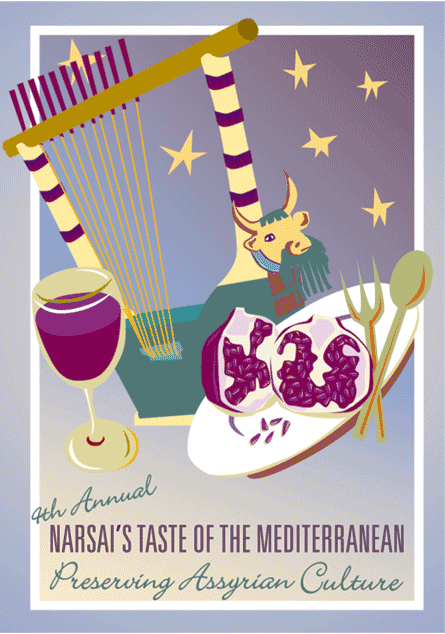 |
As a corporate sponsor of this event, Zinda Magazine is offering special student tickets at $100 (over 65% discount) to full-time Assyrian students with valid proof of enrollment at a high school or college. To obtain your tickets contact Zinda Magazine at narsai2005@zindamagazine.com. Bon appetite ! |
|
Since Smith’s passage is written in the language of dhimmitude, it is itself in need of translation. “Most of the works of Plato” means The Republic. “Most of the works of...Aristotle” includes works that Aristotle did not write and that do not reflect his philosophy. Access “for western scholars to the great classics of...Rome” means nothing. A “lasting” contribution means access to a translation from Arabic into Latin until a translation directly from the Greek is available or even means access to a translation from Arabic into Latin after a translation directly from the Greek is already available. The passive “were rendered” means “were rendered by Christians and Jews, not Muslims.”
Access “for western scholars to the great classics of Greece and Rome by their translation into Arabic, from which they were rendered into European languages” almost always means access to a Latin translation of an Arabic translation of a Syriac translation of a Greek text. Sometimes it means access to a Latin translation of an Arabic translation of a Hebrew translation of a Greek text. It can even mean access to a Latin translation of a Hebrew translation of an Arabic translation of a Syriac translation of a Greek text. Only on rare occasions does it mean access to a Latin translation of an Arabic translation of a Greek text.
A contribution “of the medieval Muslim world to Chistendom” means the translation into Latin by a Christian or a Jew of an Arabic translation by a Christian or a Jew of a Syriac translation by a Christian or a Jew of a Greek text obtained by “the medieval Muslim world” when it conquered the parts of “Christendom” that contained the libraries and monasteries in which it was kept. It means, in other words, a third, fourth, or fifth-hand version of a stolen Greek text.
Smith’s reference to the great classics of Rome is especially bizarre. She gives no examples, which is perhaps just as well, since they would be Latin translations of Arabic translations of Syriac translations of Greek translations of Latin texts. At this rate, Oxford will be telling us in a few years of French translations of Latin translations of Arabic translations of Syriac translations of Greek translations of Latin translations of French texts. The French translation will have nuit where the French text has jour.
One might imagine that the great classics of Rome would be works by Caesar, Cato, Catullus, Cicero, Horace, Juvenal, Livy, Lucan, Lucretius, Martial, Ovid, Pliny, Quintilian, Sallust, Seneca, Suetonius, Tacitus, Terence, or Virgil, but according to Franz Rosenthal in The Classical Heritage in Islam, “the only Latin text whose Arabic translation is preserved is” by Orosius!
According to dhimmi history, the Dark Ages, which is the same thing as the Middle Ages, came about because Christianity rejected the culture and wisdom of the Greeks. Had Islam not come to the rescue, the treasures of antiquity would have been forever lost. Smith’s “great classics of Greece and Rome” would have disappeared. In particular, Christians lost Aristotle, whom the Arabs magnanimously preserved for them.
Rosenthal, however, gives the following list of ancient Greek writers some part of whose works were rescued by translation into Arabic: “Theophrastus, (Pseudo-?) Euclid, Hero of Alexandria, Pappus of Alexandria, Rufus of Ephesus, Dorotheus of Sidon, Galen, Alexander of Aphrodisias, Nicolaus of Damascus, Porphyry and Proclus.” Where dhimmi history would have led us to expect the name of Plato, we see Pappus of Alexandria or Rufus of Ephesus, and instead of Aristotle we see Dorotheus of Sidon or Nicolaus of Damascus.
According to Charles Burnett in “Arabic into Latin,” a chapter of The Cambridge Companion to Arabic Philosophy, “The Republic of Plato, though translated into Arabic, was not subsequently translated into Latin.” Thus, the only work of Plato translated into Arabic did not make its way back to the West.
Though there is, according to Bernard Dod in The Cambridge History of Later Medieval Philosophy, “a tenacious legend that the West learnt its Aristotle via translations from the Arabic,” Islam did not rescue Aristotle either. In A History of Philosophy, Frederick Copleston says that “it is a mistake to imagine that the Latin scholastics were entirely dependent upon translations from Arabic or even that translation from the Arabic always preceded translation from the Greek.” Indeed, “translation from the Greek generally preceded translation from the Arabic.” This view is confirmed by Peter Dronke in A History of Twelfth-Century Western Philosophy:
“most of the works of Aristotle...were translated directly from the Greek, and only exceptionally by way of an Arabic intermediary.”
So the great rescue of Greek philosophy by translation into Arabic turns out to mean no rescue of Plato and the transmission of Latin translations of Arabic translations of Greek texts of Aristotle, either directly or more often via Syriac or Hebrew, to a Christendom that already had the Greek texts and had already translated most of them into Latin, with almost all of the work of translation having been done by Christians and Jews and none of it by Muslims.
The thesis of The Closing of the Western Mind by Charles Freeman (Knopf 2003) is that “the Greek intellectual tradition did not simply lose vigour and disappear. (Its survival and continued progress in the Arab world is testimony to that.)” No, “it was destroyed” by Christians.
This book deals with a significant turning point in western cultural and intellectual history, when the tradition of rational thought established by the Greeks was stifled in the fourth and fifth centuries A.D. This “closing of the Western mind” did not extend to the Arab world, where translated Greek texts continued to inspire advances in astronomy, medicine, and science.
Here Freeman betrays the real reason for the hyperbolic praise of medieval Islam: it is “testimony” to the destruction by Christianity of the “Greek intellectual tradition” and, by extension, to the destruction of all intellectual inquiry by the Christianity of all eras.
Johns, Smith, and Freeman praise Islam in order to dispraise Christianity. They have no love of Islam. They would be among the first stoned if Islam took over the West. What they love is hatred of Christianity, which Islam pours out in cataracts, seemingly for free.
Most Americans are disinclined to criticize other people’s religions, hence the utility of blaming Christianity in the guise of praising Islam. A Christian defending his religion seems to be going out of his way to blame Islam.
So according to Freeman, Christians “stifled” “rational thought” and closed the Western mind in the fourth and fifth centuries A.D. On no account did Greek thought “simply lose vigour and disappear.” We know this because of what the Arabs supposedly did hundreds of years later.
In fact, of course, Greek thought lost vigor long before Freeman says Christians stifled it, indeed before there were any Christians to do the stifling and almost a millennium before there were any Muslims to rescue it. Why it lost vigor is controversial. That it lost vigor and when should not be.
One explanation for the decay can be found in The Rise of the West by William McNeill. The golden age of Greece was a product of the polis; when it lost its independence, its culture and wisdom were submerged in the cosmopolitanism of empire.
As the world of philosophers enlarged, their place within it shrank, and they confined themselves to “the promulgation of a code of gentlemanly ethics, buttressed by whatever supporting metaphysical, physical, or epistemological doctrine seemed necessary.” In the second century B.C.,
“Greek philosophy became a mere surrogate for religion—and not even a very satisfactory surrogate, because of the denial of emotion which characterized all the Hellenistic schools.”
Philosophy was
“restricted to less and less ambitious intellectual formulations, in which ethical prescription played the central role, while the ideal of truth as an end in itself shriveled into the cold and wizened rationalism of the Hellenistic schools.”
“Appeals to a bygone past and to the old glories of Athens” were futile. “The extraordinary human energies that had been called into life during Athens' brief period of splendor could never be harnessed again.”
The golden age was over. In the Holy Land, the Maccabees were fighting Antiochus Epiphanes. More than eight hundred years would elapse before Mohammed founded the religion that supposedly kept the golden age alive by moving it to the Islamic world.
There was no Homer (9th to 8th century B.C.?), no Pythagoras (ca. 580 to 500 B.C.), no Pericles (ca. 495-429 B.C.), no Sophocles (ca. 496-406 B.C.), no Thucydides (died ca. 400 B.C.), no Plato (ca. 428-348 B.C.), no Aristotle (384-322 B.C.), no Euclid (fl. ca. 300 B.C.), no Archimedes (ca. 287-212 B.C.).
If there is any blame for losing Aristotle, it belongs to Greek philosophy itself, not to the Christianity Freeman blames. “In the course of a few centuries” after the death of Aristotle, says McNeill, his disciples “simply dispersed, allowing Aristotle’s works to fall into an undeserved neglect.”
Upon the death of Aristotle, the world was left with a number of “exoteric” writings, that is, published works, now lost, chiefly dialogues in Platonic form and perhaps content, and with his surviving followers, whose lectures on Aristotelian philosophy became the “esoteric” writings we now have, that is, writings unpublished in the lifetime of Aristotle. Writings of both classes found their way into the libraries of Alexandria, together with as many or more pseudo-Aristotelian works. As a result, a chaotic and confusing situation arose, with genuine works of Aristotle competing for attention with works falsely attributed to him, with works of Aristotelian philosophers reflecting in a difficult-to-ascertain fashion the actual thought of Aristotle, and with all these works located in places difficult to ascertain with specificity, though primarily in the hands of Aristotle’s followers and in the libraries of Alexandria.
Over the centuries, a series of editors attempted to establish a genuine canon of Aristotle, the center of their efforts shifted to Rome, the exoteric writings were lost, and the Aristotle we have today gradually emerged, which is based on Greek texts, not Arabic.
Meanwhile, Plato continued to be the Greek philosopher of choice, especially in the Hellenistic world; Neoplatonism, which emphasized the dogmatic elements of Plato at the expense of his critical aspect, came to dominate metaphysical speculation; and Aristotle, when he was not simply ignored, was interpreted in a Neoplatonic fashion that submerged his differences with Plato, thereby destroying his unique contribution to philosophy.
When Islam conquered most of the Christian lands of Asia and the Middle East and all of them on the north coast of Africa, including Egypt and with it Alexandria, part of the spoils of victory were small centers of Hellenistic scholarship, often Nestorian Christian, that continued for a while translating Greek philosophy into Syriac. Eventually most of the extant writings of Aristotle were translated into Arabic, generally via Syriac, sometimes via Hebrew, on rare occasions directly, together with influential pseudo-Aristotelian texts. These translations became the basis of the Aristotelianism of the Islamic world, which was innocent of the Greek of the original and of the originality of its author.
Such is, in short, the origin of what would become what Johns calls “the Arab contribution to Western culture” and Smith “one of the most significant and lasting contributions of the medieval Muslim world to Christendom.”
It is the story of two golden ages, one Greek and one Islamic. The former degenerated from gold to silver to bronze to iron to iron pyrite; the latter began with the fool’s gold. The mistake of the Islamic philosophers was that they were unwary of Greeks bearing gifts, or, to be precise, of what Islam had stolen. They unwrapped pretty packages labeled “Plato” and “Aristotle” and got Plotinus, Porphyry, and Proclus. They thought they were getting Aristotelianism, but they got Neoplatonism, which is neither Platonic nor Aristotelian.
However, it must be said in extenuation of the Islamic philosophers that they were not alone in their mistake, which to this day clouds the minds of many Christians thought most spiritual, who cannot recognize Neoplatonism, do not know what is wrong with it, and have no idea why they should care. For “what we fondly call ‘primitive’ errors do not pass away,” says C. S. Lewis in Miracles, “They merely change their form.” Moreover, Western philosophers, in contrast to the closed-minded Muslims, have become so open-minded that they will believe anything, particularly if it is not true.
According Cristina D’Ancona in “Greek into Arabic,” a chapter of The Cambridge Companion to Arabic Philosophy, among the first works of Greek philosophy translated into Arabic were The Enneads of Plotinus and The Elements of Theology of Proclus. As D’Ancona correctly notes, these are “basic texts of Greek Neoplatonism,” and she says that their early introduction “had long-term consequences for the entire development” of Islamic philosophy.
Islamic philosophers tended to accept the Greek Neoplatonic view that Plato and Aristotle were in fundamental agreement. This view was one of the “general assumptions typical of this first assimilation of Greek thought into an Islamic milieu” that “would remain the trademark of” Islamic philosophy.
Among the Neoplatonic works translated into Syriac or Arabic were those by Plotinus, Porphyry, Iamblichus, Themistius, Syrianus, Proclus, Pseudo-Dionysius, Simplicius, Philoponus, and Olympiodorus. The most important were those of Plotinus, Porphyry, and Proclus, as they were in the West.
Plotinus was the founder of Neoplatonism, author of The Enneads. The so-called Theology of Aristotle is actually a rearrangement and paraphrase of part of The Enneads. Another rearrangement and paraphrase falsely attributed to Aristotle, this one of Proclus’s Elements of Theology, became The Book of Aristotle’s Exposition of the Pure Good, later translated into Latin as The Book of Causes. Porphyry was Plotinus’s literary executor and the author of the Isagoge, widely read in both East and West as an introduction to Aristotle’s logical works.
Neoplatonism is a long way from the Plato and Aristotle of the fourth century B.C. D. A. Rees has stated the difference between Platonism and Neoplatonism exceedingly well in “Platonism and the Platonic Tradition” in The Encyclopedia of Philosophy.
“Platonists [Neoplatonists] looked for a static body of doctrine...and thus tended to minimize the tentative and less systematic aspect of Plato’s philosophizing.”
The characteristic doctrine of Neoplatonism is emanationism, the idea that the One emanates another like itself but inferior, which in turn emanates yet another like itself but inferior, and so on. Emanationism thus typically ends up devaluing matter and the physical universe, which are at the bottom of the series of emanations, and it tends to merge with Gnosticism, with which it also shares an interest in the occult. Emanationism differs from creation in that emanation is involuntary while creation takes place according to the will of God. Since Islam shares with Christianity a belief in creation, Neoplatonism is fundamentally incompatible with both religions.
One article in The Encyclopedia of Philosophy says that Avicenna (980-1037 A.D.) was the greatest philosopher of Islam; another article says that Averroes (1126-1198 A.D.) was. Be that as it may, between them was Al-Ghazali (1058-1111 A.D.), who vanquished them both.
Avicenna attempted to extend the Neoplatonic Aristotle he inherited into a large and systematic philosophy of his own, Al-Ghazali criticized the elements of Avicenna’s philosophy that he found incompatible with Islam, and Averroes defended Islamic philosophy against Al-Ghazali and commented on Aristotle. The result was that Avicenna dominated the philosophy of the fool’s gold age, Al-Ghazali triumphed, and few paid attention to Averroes.
From Al-Ghazali’s point of view, Avicenna and other Islamic philosophers believed in a watered-down Islam, if they believed in Islam at all, because they argued for an eternal world instead of a created one, denied bodily resurrection, and confined God’s knowledge to universals.
Al-Ghazali was an adherent of occasionalism, the interesting but disastrous belief that the causation we perceive in the world is an illusion since all events are directly caused by God. There is no room in occasionalism for secondary causes or God’s working indirectly. Al-Ghazali even says that when someone is decapitated, it is not correct to say that he died because his head was cut off! Someone who has been beheaded died by his ajal, ajal meaning the time in which God creates in him his death, regardless of whether this occurs with the cutting of the neck, the occurrence of a lunar eclipse, or the falling of rain. All these for us are associated things, not generated acts, except that with some the connection is repeated according to habit but with some they are not repeated.
When I see the works of Al-Ghazali advertised on Islamicist Websites, I wonder whether the terrorist beheaders have read them. Perhaps Osama bin Laden thinks that he bears no responsibility for 9/11, since the passenger jets that crashed into the World Trade Center and Pentagon are only “associated” with the deaths of that day. So too was the weather or, as Michael Moore points out, the President’s reading to schoolchildren in Florida.
By the twelfth century, Al-Ghazali had won. Islam rejected Neoplatonism and with it philosophy in general, so much so that the Arabic texts of some of Islamic philosophy’s greatest works, for instance, Averroes’s commentaries on Aristotle, were lost, and the works preserved only by means of Latin translations. As a matter of fact, far more Arabic philosophy has been rescued by Latin translations than Greek philosophy rescued by Arabic translations!
Why should we care that dhimmi history has convinced most educated people that Christians lost Aristotle and Muslims restored him to them? Why should we care that they believe in a Golden Age of Islamic philosophy that never occurred? We should care because we should care about the truth, but more than that, because these false beliefs are actually quite dangerous, for in the malignant minds of terrorists, they justify murder. Dhimmi history confirms the sense of superiority Islamofascists feel, it sympathizes with their wounded vanity, it shares their enemies, it reminds them of their past glories, it makes them feel unappreciated, it flatters them, it makes them suspect treachery, and it tells them that they are right.
Dhimmi history has the disastrous effect of heightening the “sense of injur’d merit” that the jihadists feel—along with Milton’s Satan. The lies of dhimmi scholars are, like the borders of Islam, bloody.
|
For Free Admission Coupons to This Event Click Here. |
|

